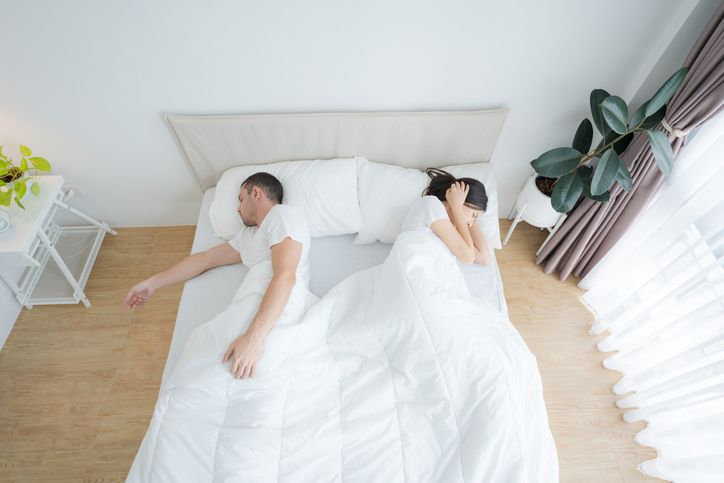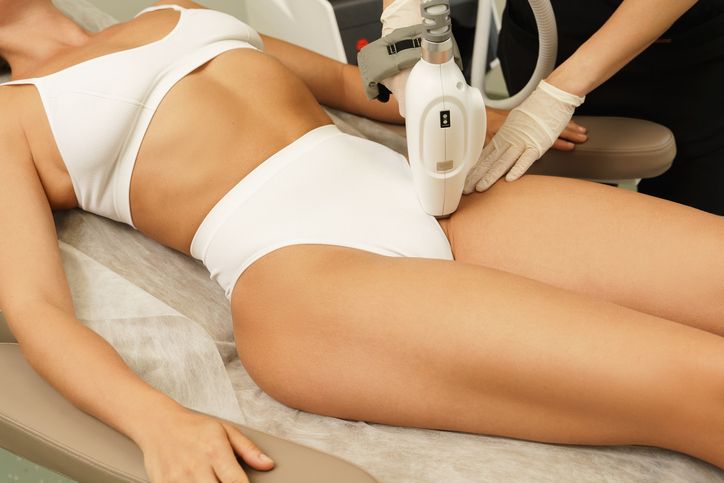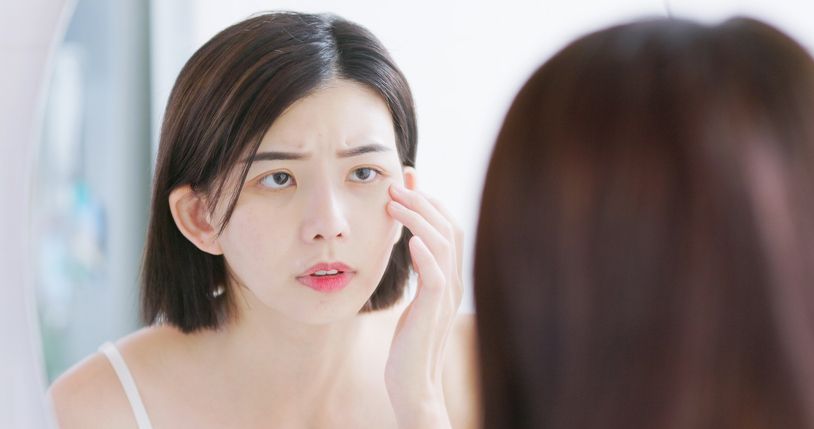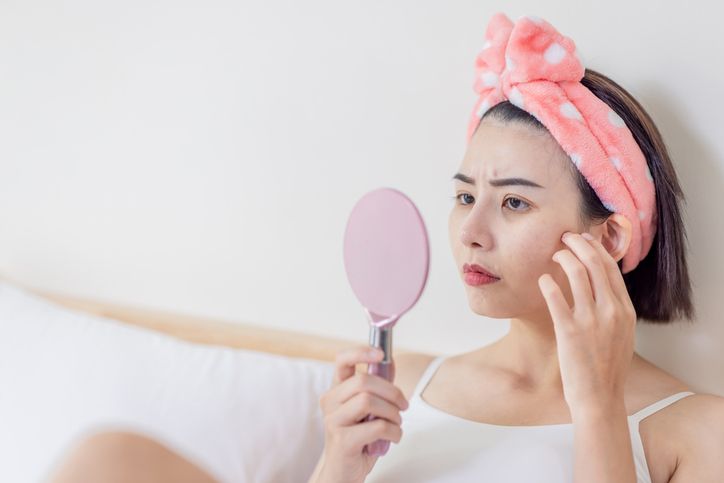- Home
- Trend
- Weight Loss Strategies
- Acne Tips
- Hair Health Information
- Blemish Removal Tips
- Acne Scar Removal Tips
- Muscle Building Techniques
- Intimate Care Tips
- Postpartum Intimate Care
- Eye Bags Wiki
- Tips for Face Slimming
- Secret of Permanent Hair Removal
- Breast Enlargement Tips
- Cure to Snoring
- Marionette Lines
- Skin-Tightening Secrets
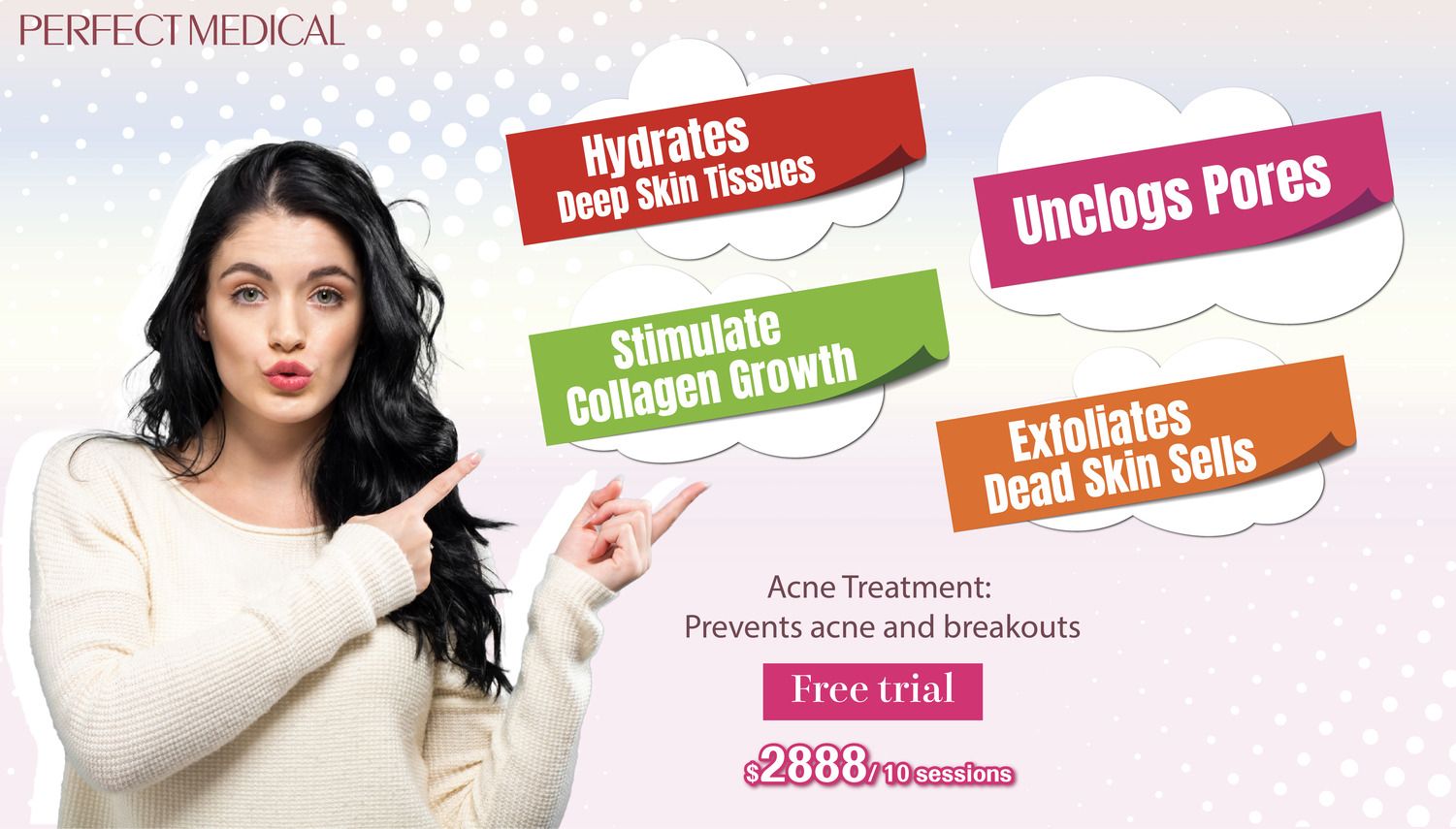
免費體驗
Acne Treatment
1 Minute Self-Registration
Date should not be before minimal date
Acne is a common skin issue that many people face, and for some individuals, it tends to worsen during their menstrual cycle. This type of acne, often referred to as "period acne", "menstrual acne" or "premenstrual acne", is typically associated with hormonal fluctuations that occur during the menstrual cycle. While it can be challenging to prevent entirely, there are several ways to manage and minimise period acne effectively.
1
What Causes Period Acne?
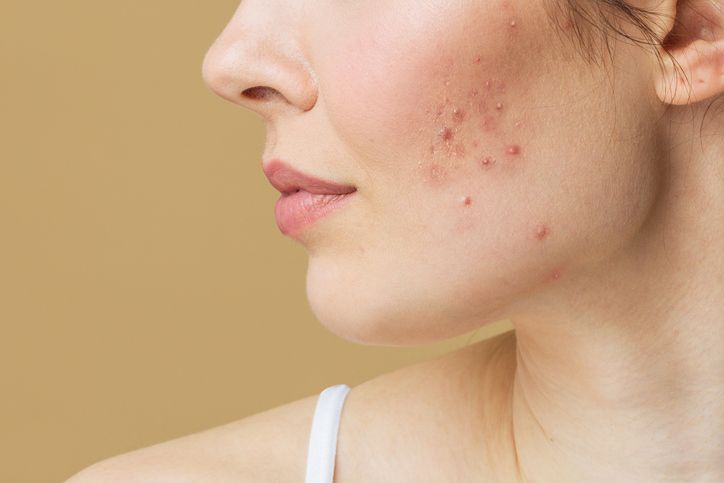
Period acne is primarily driven by hormonal changes that occur during the menstrual cycle. These hormonal fluctuations can trigger a series of events in the skin, leading to the development of acne. Here's a closer look:
Hormonal fluctuations
Oestrogen and progesterone hormones play a crucial role in regulating the menstrual cycle. In the days leading up to menstruation, there is typically a rise in progesterone levels and a drop in oestrogen levels. This hormonal shift can have several effects on the skin:
- Increased Oil Production: The decrease in oestrogen can stimulate the sebaceous (oil) glands in the skin to produce more oil. Excess oil can clog pores, leading to the formation of acne lesions.
- Clogged Pores: The combination of increased oil production and shedding of dead skin cells can lead to the blockage of hair follicles and pores.
- Breakouts: Clogged pores can become inflamed and infected, resulting in pimples, blackheads, and whiteheads.
Secondly, testosterone, often considered a male hormone, is also present in lower levels in females. However, during the menstrual cycle, there can be an increase in testosterone levels. Elevated testosterone can stimulate the sebaceous glands to produce even more oil, exacerbating the risk of acne development.
Interestingly, it's important to note that not all individuals who experience hormonal fluctuations leading to acne necessarily have regular menstrual periods. Hormonal acne can be triggered by changes in hormone levels, such as an increase in androgens (male hormones like testosterone) relative to oestrogen. These changes can occur not only during the menstrual cycle but also in other situations. For instance:
1. Puberty: Both boys and girls go through puberty, during which there's a surge in hormones like testosterone. This hormonal shift can lead to acne development, even before a person starts having regular menstrual periods.
2. Polycystic Ovary Syndrome (PCOS): PCOS is a hormonal disorder that can affect people with irregular menstrual cycles or even those who do not menstruate at all. It often leads to elevated androgens, which can cause acne, among other symptoms.
3. Stress: High levels of stress can also affect hormone balance and lead to acne breakouts. Stress-induced hormonal changes can occur regardless of a person's menstrual cycle status.
In summary, while hormonal acne is commonly associated with the menstrual cycle, it can occur in individuals who may not have started their periods yet (such as during puberty) or in those who have irregular or absent menstrual cycles due to conditions like PCOS. The development of acne is primarily influenced by hormonal fluctuations, and these fluctuations can arise from various factors beyond the menstrual cycle.
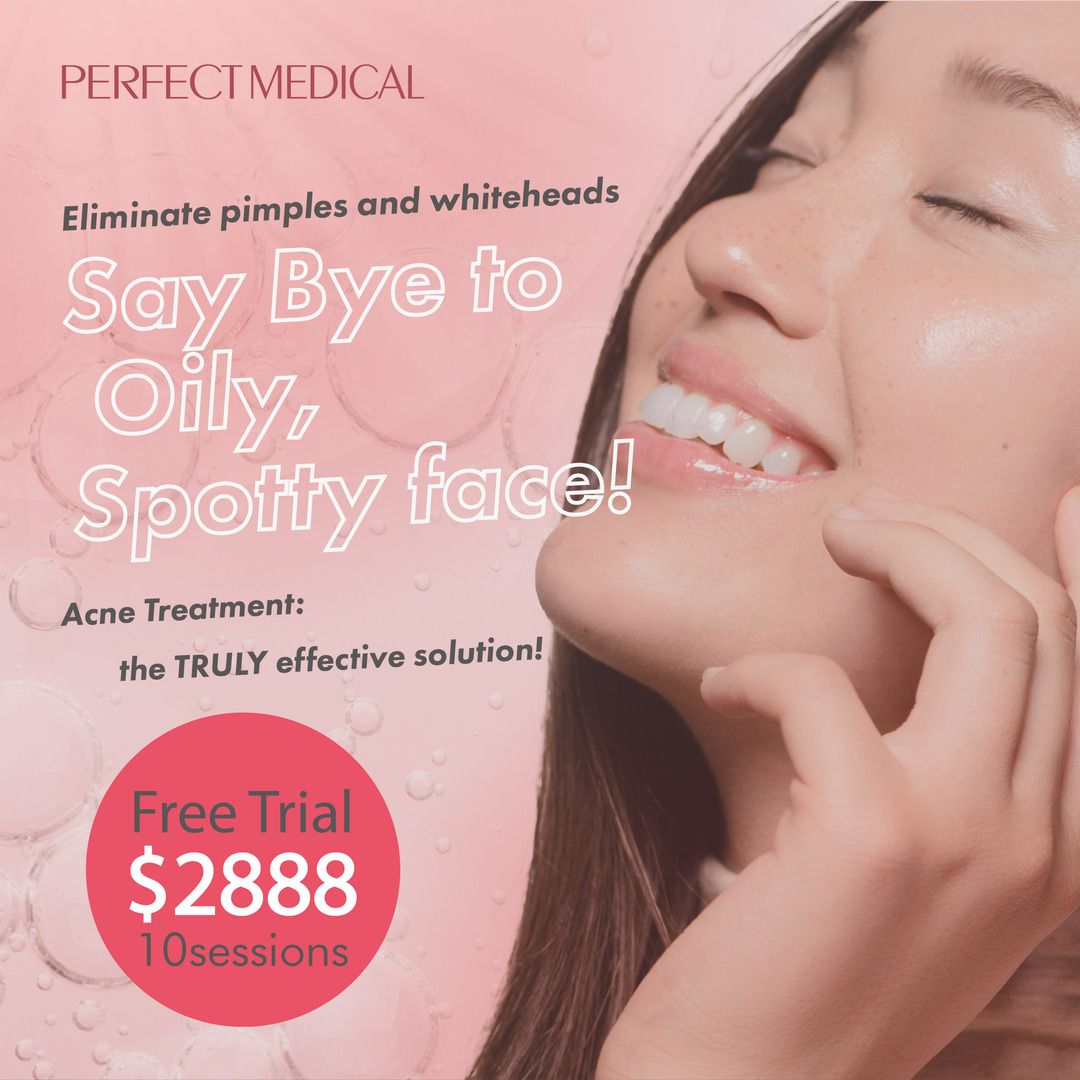
2
Tips for Managing Period Acne
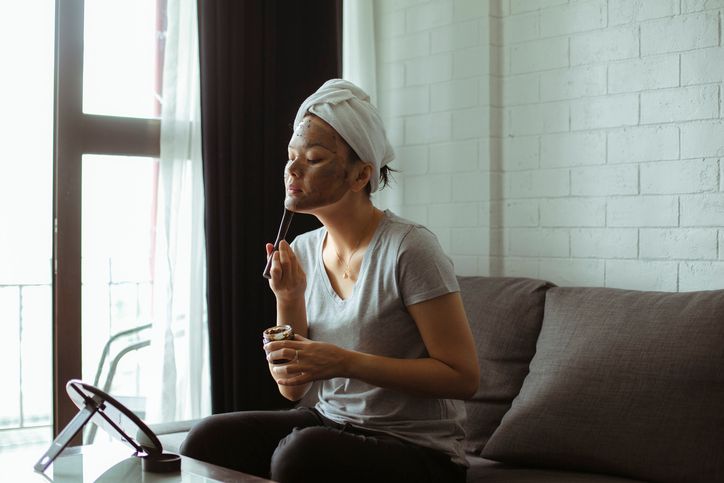
While it may not be possible to completely prevent period acne, you can adopt various strategies to manage and reduce its severity:
1. Maintain a Consistent Skincare Routine
- Gentle Cleansing: Maintaining a consistent skincare routine begins with using a mild, non-comedogenic (won't clog pores) cleanser to wash your face twice a day. This gentle cleansing removes excess oil, dirt, and impurities from your skin, helping to keep it clean and fresh.
- Avoid Over-Cleansing: It's crucial to strike a balance. Over-cleansing the skin can strip away its natural oils, which can lead to the skin producing even more oil to compensate. Stick to a gentle cleansing routine to avoid this cycle.
- Exfoliation: Exfoliating your skin 1-2 times a week is an essential step. This helps in the removal of dead skin cells that can accumulate on the skin's surface and potentially clog pores. Choose a gentle exfoliant to prevent irritation and promote smoother, clearer skin.
2. Use topical treatment
- Salicylic Acid: Products containing salicylic acid are effective at treating acne. Salicylic acid is a beta hydroxy acid that penetrates into the pores, exfoliating the inside of hair follicles. This helps prevent and treat clogged pores and can reduce the appearance of acne lesions.
- Benzoyl Peroxide: Benzoyl peroxide is known for its antibacterial properties. It can kill acne-causing bacteria on the skin's surface and reduce inflammation in acne-prone areas. It's an effective option for treating and preventing acne breakouts.
3. Maintain a healthy diet
- Stay Hydrated: Drinking enough water is essential to maintain skin hydration. Well-hydrated skin tends to look healthier and may be less prone to acne. Adequate hydration can also help flush toxins from your body.
- Balanced Diet: Your diet plays a significant role in skin health. Opt for a balanced diet rich in fruits, vegetables, whole grains, and lean proteins. These foods provide essential nutrients and antioxidants that can help manage inflammation, which is associated with acne. Reducing your intake of sugary and processed foods can also contribute to clearer skin.
4. Hormonal birth control
- Consult a Healthcare Provider: In cases of severe and persistent period acne, consider consulting a healthcare provider. They can discuss hormonal birth control methods, such as birth control pills, which can help regulate hormonal fluctuations. These medications can be particularly effective in reducing acne breakouts associated with hormonal changes.
5. Stress management
- Relaxation Techniques: Stress is a known trigger for acne flare-ups. Incorporating stress-reduction techniques into your daily routine, such as yoga, meditation, or deep breathing exercises, can help manage stress levels. Lowering stress can potentially reduce the frequency and severity of acne breakouts.
6. Hands off
- Avoid Picking or Squeezing: It's crucial to resist the temptation to pick or squeeze acne lesions. Such actions can lead to scarring and make the condition worse. Allow acne to heal naturally, and if necessary, apply the recommended topical treatments.
7. Seek professional services
- Dermatologist Consultation: If your acne remains severe, persistent, or unresponsive to over-the-counter treatments, seeking professional advice from a dermatologist is advisable. Dermatologists can provide personalised recommendations, prescribe medications tailored to your specific needs, and offer specialised treatments to address stubborn acne issues.
- Perfect Medical's Acne Treatment: This treatment is particularly suitable for individuals with acne-prone skin. This advanced treatment utilises vacuum microdermabrasion to effectively address several skin concerns. It works by clearing out clogged pores, soothing inflammation, and expediting the skin's natural shedding process, all of which are crucial in managing this condition. This versatility makes it a valuable option for individuals residing in high-stress environments, as it addresses a multitude of skin concerns beyond the scope of period-related acne.
Remember that managing period acne often involves a combination of approaches, and what works best may vary from person to person. It's important to be patient and consistent in your skincare routine and consult with a healthcare professional if needed to achieve the best results.
- Is Vitex the Key to Clear Skin? Explore How This Herb Helps Manage Acne and Reduces Inflammation
- 15 Must-Know Ways to Get Rid of Acne: 6 Topical Pimple Treatments & 9 Home Remedies
- How Hormones and Aging Connect to Cystic Acne | Perfect Medical
- Warning: Seasonal Breakouts are Coming! Best Acne Cleansers for Hong Kong's Humid Spring 2025!
3
Those Sounds Great but I'm Having Hormonal Breakouts Now! What Can I Do Before Going Out?
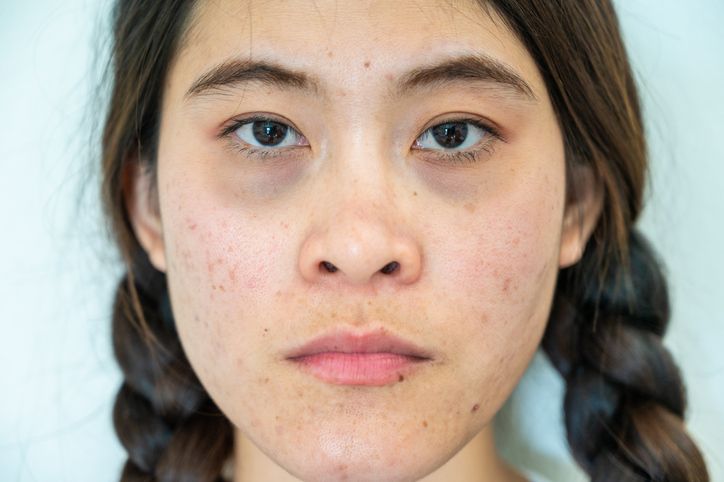
1. Start with a clean skin
Begin by thoroughly cleansing your face to remove excess oil, dirt, and any existing makeup. Clean, hydrated skin provides a better base for makeup application and helps prevent further breakouts.
2. Use a primer
Apply a makeup primer designed for acne-prone skin. This helps create a smooth surface for makeup and can also extend its wear time. Look for primers that contain ingredients like salicylic acid to further combat acne.
3. Choose the right foundation
Opt for a foundation that is non-comedogenic (won't clog pores) and oil-free. These foundations are less likely to exacerbate acne. Mineral-based foundations can also be a good choice, as they often contain fewer irritating ingredients.
4. Conceal strategically
Use a concealer that matches your skin tone to cover individual blemishes. Dab a small amount of concealer onto each blemish and blend gently using a clean makeup brush or your fingertip. Avoid overloading the area with concealer, as this can make the blemish more noticeable.
To conceal redness and uneven skin tone caused by acne, consider using a colour-correcting concealer. For redness, use a green-toned concealer; for dark spots or discoloration, opt for a peach or orange-toned concealer under your foundation.
5. Set with powder
After applying foundation and concealer, use a translucent, oil-free setting powder to set your makeup. This helps prevent shine and keeps your makeup in place throughout the day. Be cautious not to use too much powder, as it can make the skin look dry or accentuate blemishes.
Remember that makeup can help conceal acne temporarily, but it's essential to continue with a consistent skincare routine to address the underlying causes of acne. Additionally, be gentle when applying and removing makeup to avoid irritating the skin further. If you find that makeup alone isn't sufficient, there's other methods below on what you can do the day before to save your mild acne situation.
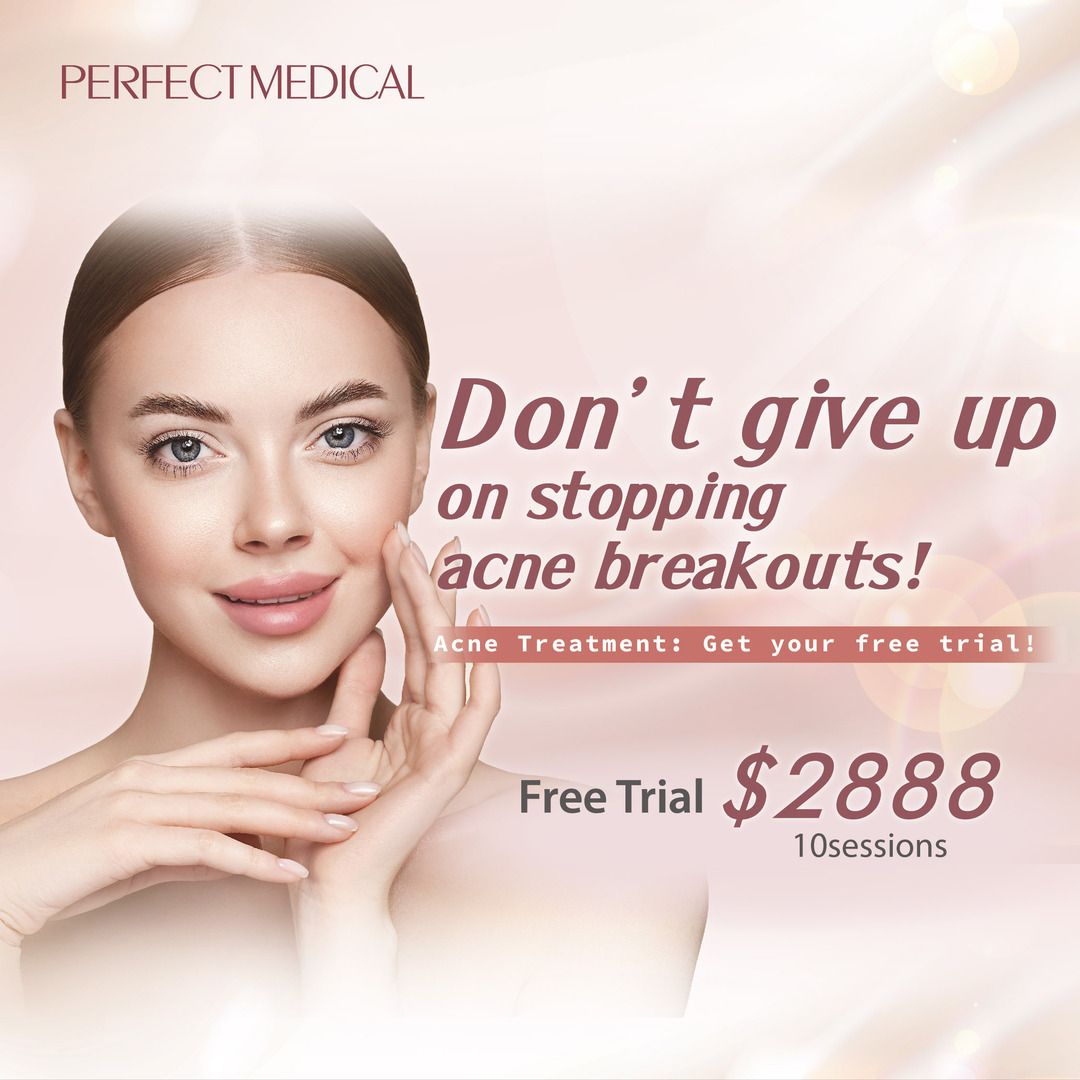
4
Natural Remedies that Provide Anti-Inflammatory Properties
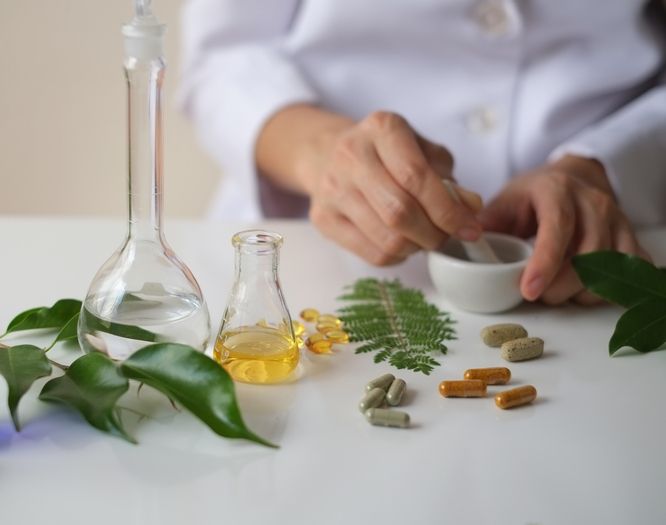
Natural remedies with anti-inflammatory properties can be valuable tools in managing acne and reducing skin inflammation. These remedies offer alternative options to traditional skincare products and medications. Here are some well-known natural remedies, each with its own set of benefits:
Tea Tree Oil
This essential oil is renowned for its antimicrobial and anti-inflammatory properties. When applied topically to affected areas, it can help combat the bacteria associated with acne and reduce inflammation. It's important to dilute tea tree oil before applying it to the skin to prevent irritation.
Honey
Honey possesses natural antibacterial and anti-inflammatory attributes, making it an excellent choice for skincare. It can be used in various ways, such as in homemade masks or as a spot treatment. Honey can help soothe irritated skin, reduce redness, and promote healing.
Aloe Vera
Aloe vera is well-known for its soothing properties. When applied topically, it can provide relief to irritated or inflamed skin. Aloe vera gel can be particularly effective in reducing redness and calming skin that's prone to inflammation.
Green Tea
Green tea is rich in antioxidants and contains anti-inflammatory compounds. It can be used both topically and as a beverage. Topically, green tea can be applied as a toner or included in homemade skincare masks. When consumed, it can contribute to reducing overall inflammation in the body, potentially benefiting skin health.
Turmeric
Turmeric is famous for its anti-inflammatory and antioxidant properties. It can be incorporated into skincare routines through DIY masks or taken as a dietary supplement. Turmeric can help reduce skin redness and inflammation, promoting a healthier complexion.
Omega-3 Fatty Acids
These essential fatty acids are found in foods like fatty fish (e.g., salmon) and flaxseeds. When included in one's diet, omega-3 fatty acids have been shown to have anti-inflammatory effects throughout the body, including the skin. Consuming these foods can contribute to overall skin health and help manage inflammatory conditions like acne.
When using these natural remedies, it's essential to be patient and consistent in your approach. While they can be beneficial for managing acne and inflammation, results may vary from person to person. Additionally, it's a good practice to perform a patch test before applying any new product to your skin to check for potential allergic reactions or sensitivities.
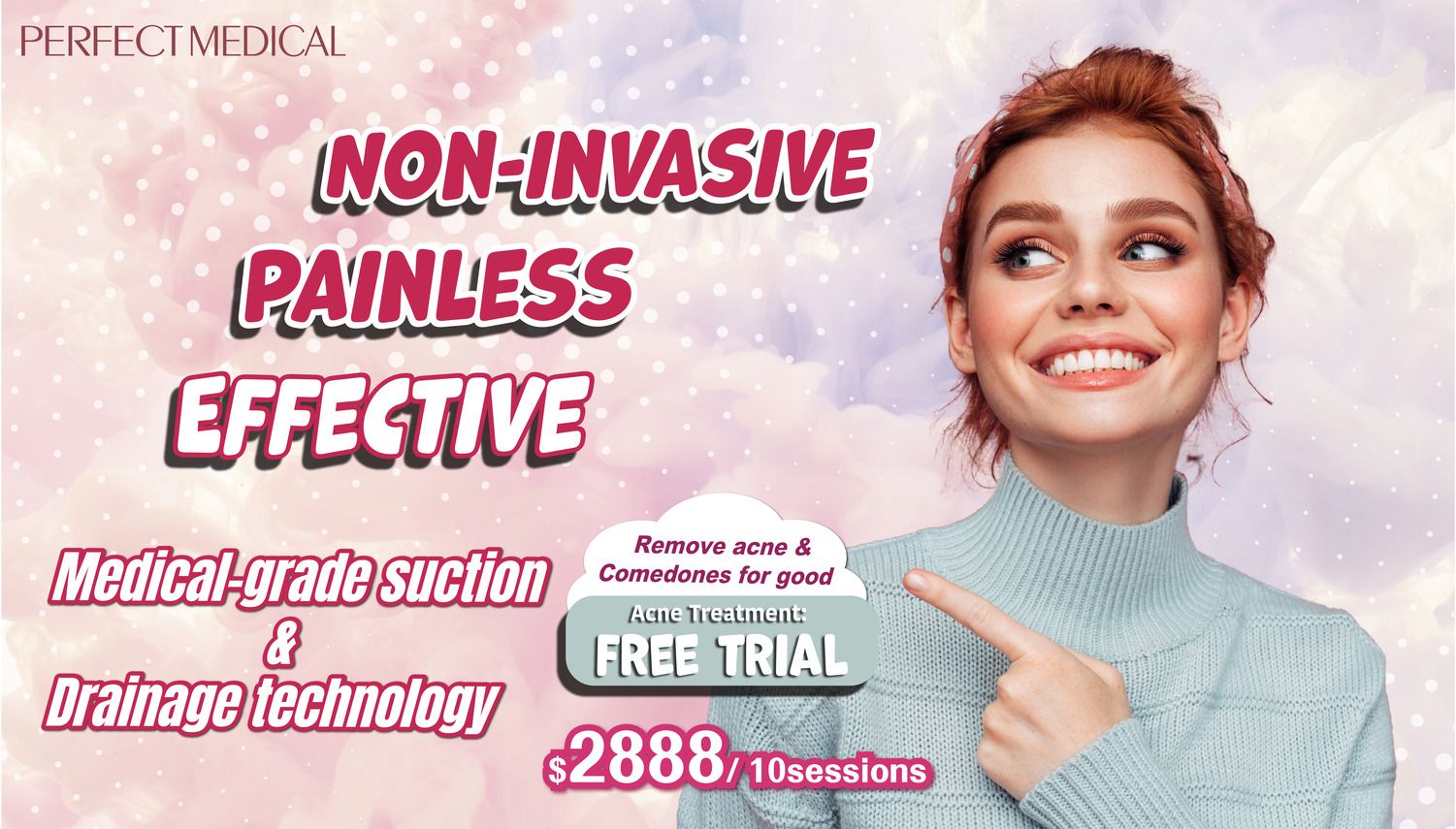
免費體驗
Acne Treatment
1 Minute Self-Registration
Date should not be before minimal date
5
Last Few Words
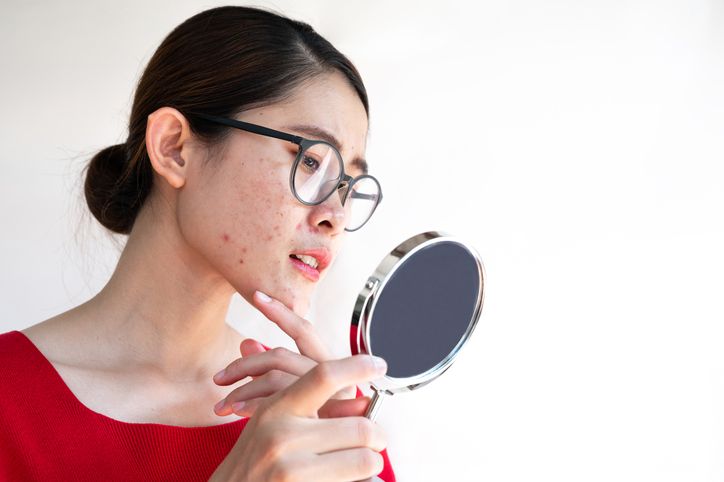
Period acne is a common and temporary condition for many people. It may require some trial and error to find the most effective management strategy for your skin. Be patient and consistent with your skincare routine, and consult a healthcare provider or dermatologist if you have concerns about your acne or its treatment.
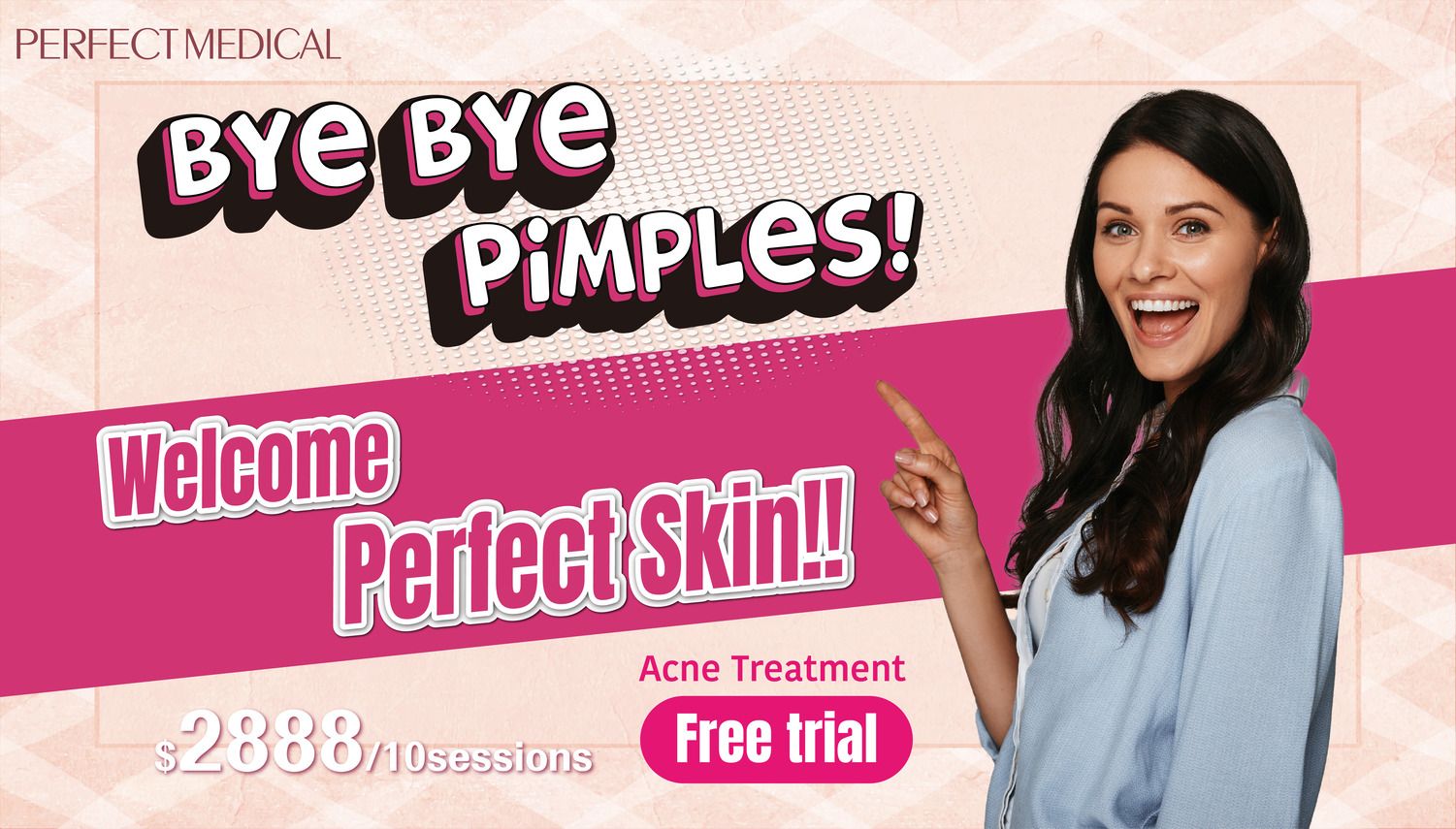
免費體驗
Acne Treatment
1 Minute Self-Registration
Date should not be before minimal date
FAQ

1. Is period acne considered adult acne?
Period acne can indeed be classified as a form of adult acne. Adult acne encompasses acne that develops in individuals beyond their teenage years. In this context, period acne specifically refers to acne breakouts that occur in response to hormonal fluctuations during the menstrual cycle. While teenage acne is often associated with puberty, adult acne, including period-related acne, can affect individuals of various ages, including adulthood.
2. What are the common acne symptoms that hormonal acne will have?
Hormonal acne tends to manifest with specific symptoms that set it apart from other forms of acne. Common characteristics of hormonal acne include breakouts, particularly on the lower face, jawline, and chin areas. These breakouts often consist of inflammatory pimples like papules and pustules. Notably, hormonal acne's occurrence or exacerbation is closely tied to the menstrual cycle, with breakouts frequently occurring before or during menstruation. In more severe cases, hormonal acne can lead to the development of deep, painful cystic acne lesions and increased oiliness of the skin.
3. Can period acne turn into cystic acne if I don't treat it?
Period acne left untreated or inadequately managed can indeed progress into cystic acne in some instances. Cystic acne represents a severe form of acne characterised by the formation of large, painful, and deep cysts beneath the skin's surface. The importance of treating and managing period-related acne lies in preventing its escalation into cystic acne. Timely intervention, proper skincare routines, and, if necessary, consultation with a dermatologist can help mitigate the risk of such progression.
4. Is there any downtime for Acne Treatment from Perfect Medical?
The extent of downtime associated with Acne Treatment from Perfect Medical can vary depending on the specific procedure performed and individual skin sensitivity. In general, treatments such as microdermabrasion may result in temporary redness and mild skin sensitivity. However, these side effects typically subside within a day or so, which is considered minimal downtime.
5. Can oral antibiotics treat severe acne?
Oral antibiotics work by reducing the number of acne-causing bacteria on the skin's surface and in hair follicles. They also have anti-inflammatory properties that help decrease the redness and swelling associated with acne lesions. This dual action makes oral antibiotics particularly useful for severe cases of acne, including cystic acne. Commonly prescribed oral antibiotics for acne include doxycycline, minocycline, and tetracycline, among others. These antibiotics are typically taken for a specified duration, often several weeks or months, as determined by a healthcare provider. The goal is to achieve a significant reduction in acne lesions and to prevent new ones from forming.






